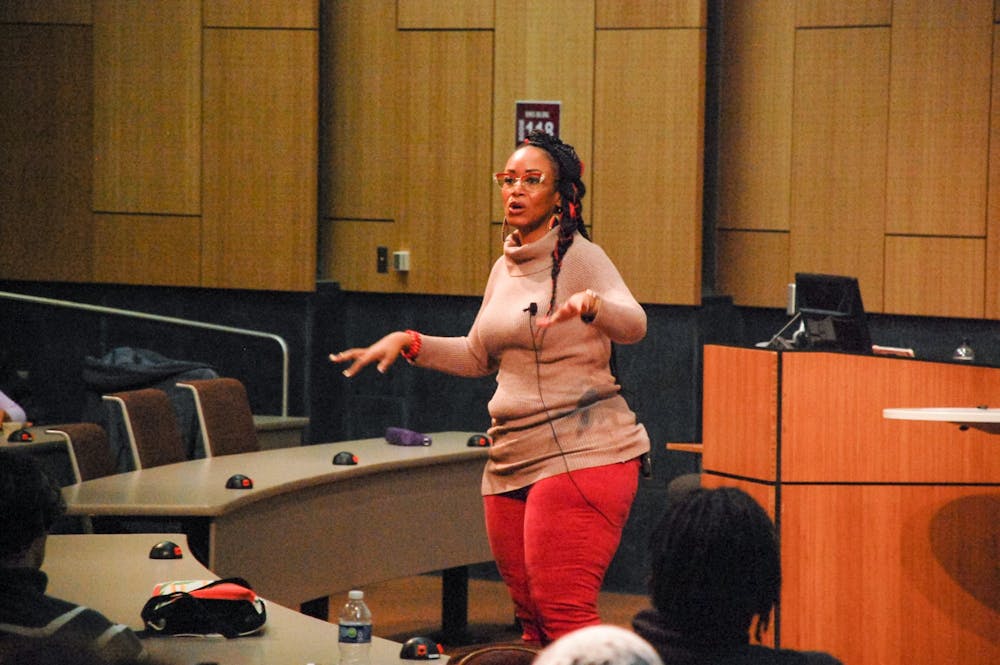MLK Keynote Speaker: Feminista Jones discusses the history and misconceptions of Martin Luther King Jr.

Feminista Jones speaks on Dr. King's legacy of radical activism Tuesday, Jan. 17 in French Auditorium.
Feminista Jones was met with an uproar of applause from a busy crowd while she made her way to the podium to speak about the misconceptions about Dr. Martin Luther King Jr.'s life.
Central Michigan University continued its celebration of Dr. Martin Luther King Jr. with keynote speaker Feminista Jones Jan. 17 in the French Auditorium.
The event, organized by the Multicultural Academic Student Services Office (MASS), focused on how radical Martin Luther King Jr. was; in addition to how the education system has left out important aspects of his life and legacy to make him more appealing to a larger audience.
“We’ve been taught bits and pieces of his life and his works and the things that have been determined to be palatable,” Jones said. “The things that won’t scare you, the things that won’t inspire you necessarily to do anything that disrupts the status quo.”
Jones said that Dr. King was not just an advocate for racial equality specifically, but also focused on topics such as labor rights, housing rights and often spoke out against the war. All of which caused him to lose some support from his followers. She said a lot of this gets ignored when students learn about Dr. King in schools and that there is much about his life that public narratives have changed, such as his relationship with Malcom X.
Jones explained how she believes that if people studied the pair of activists, they would see that they were not pitted against each other as much as the public often thinks. Because of these incorrect narratives, many people do not learn about Dr. King’s actual history and get left with a tainted, incomplete view of who he actually was.

Feminista Jones speaks on Dr. King's legacy of radical activism Tuesday, Jan. 17 in French Auditorium.
“She made up some great points because how she talked about Martin Luther King, I think we have a very warped perception of him and what we’re taught in schools.” Lansing junior Peace Okoro said. “There were some things that I already knew from my own research, but I think it’s great to make that information more public.”
By sharing personal stories and cracking jokes, Jones invited participation from the crowd and got audience members involved early and often. Jones asked about King’s life to test the audience’s knowledge and to see how much the school systems had left out of the curriculum.
Jones also spoke about activism and how there is a stark contrast in the amount of activism seen during the protests surrounding George Floyd’s death and the lack of activism currently. She attributes a lot of this not to the idea that problems have been solved, but to the idea that people had more free time and were more available during the height of the COVID-19 pandemic.
Jones herself is an activist, author, educator and retired social worker who focuses most of her work around race, feminism, queer identity and mental health. She is an award-winning author for her book, “Reclaiming Our Space: How Black Feminism is Changing the World from the Tweets to the Streets“ and teaches classes at Temple University.
She does not go to protests anymore though. Jones said that in areas that do not allow open carry all she has to protect herself is a sign while the police have militarized weapons and equipment.
“Either I can take my gun or I’m not going because I would rather die on my feet than live on my knees.” Jones said.
Jones said she still gets tailed by police for protests and events that she used to organize and that after awhile, a lot of activists feel like they cannot keep participating in events like they used to do. There needs to be people to pick up where others left off. That is where young people can step up and make a difference.
“We can all be social justice leaders in different ways, and we all need to find our purpose,” Lafayette, Colorado freshman Lorenzo Harrison Anguiano said. “Even though I might not be a Black individual, I am still an ally and a Latinx student and I really need to fight for the justices and against the oppression that minority groups face.”
Jones emphasized the fact that famous social justice activists were relatively young when they began. People like Dr. King, Malcom X and Rosa Parks were all the same age as college students when they started to make a difference. And now the torch is once again being passed on to the next generation to fight and to make a difference in the world.






